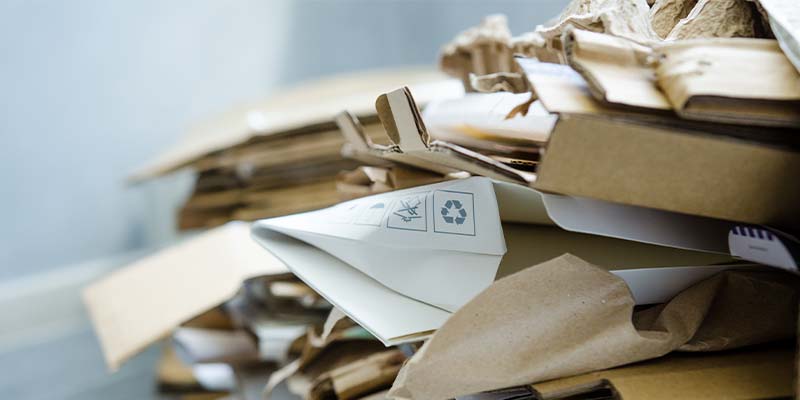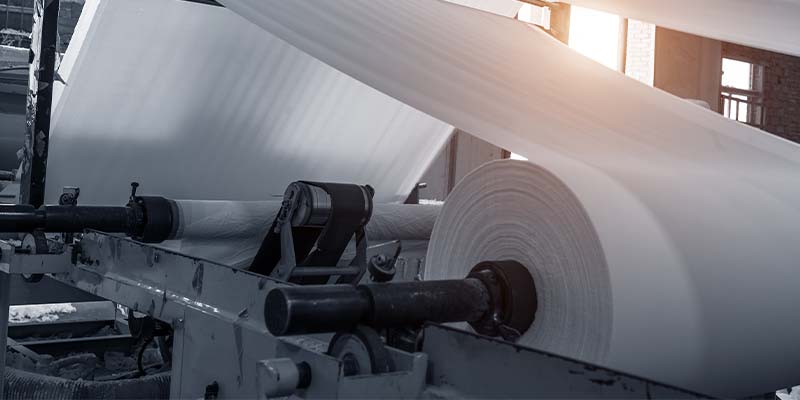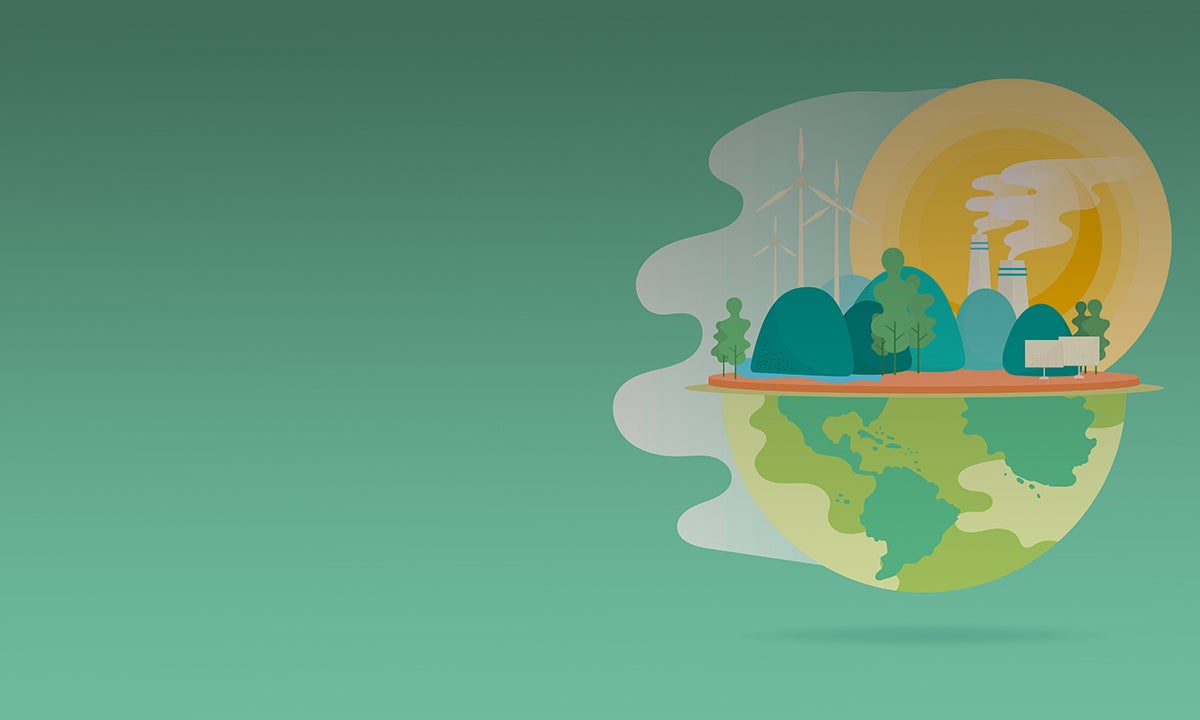Ecologically considerate practices often get bundled together, making it difficult to unpick the environmental claims made by companies across pretty much every commercial sector. There is a clear distinction between ‘sustainable’ and ‘recycled’ and it’s important to understand how they differ and what this means in terms of the potential environmental impact they may make.
“At Ruddocks we work hard to strike a balance between sustainable sourcing and responsible recycling practices. We always endeavour to help our clients understand the options, evaluate the cost vs benefit and make commercially balanced decisions when it comes to specifying print solutions. It’s all about acting in the best interests of our clients, their stakeholders and the wider environment, by helping them cut through the hearsay and make choices which are informed by facts.”

The Definition At A Glance
Recycling means repeatedly reusing an item, either in its entirety or by processing all or some of its component parts, resulting in them taking a completely new form. On the other hand, sustainable refers to anything that can be produced and maintained at a certain rate/level, with little or no impact on natural resources. In order to make truly responsible purchasing decisions, it’s important to know the difference and to be fully aware of a few commonly held misconceptions.
Four Common Myths About Sustainability And Recycling
There are many misconceptions regarding both sustainability and recycling that prevent both consumers and customers from making eco-friendly choices. Here we take a closer look at four of the most common myths regarding recycling and sustainability.
MYTH 1
"Paper causes deforestation"
Despite the negative press paper has received over the years and numerous suggestions that it contributes significantly to deforestation and harms the environment, this is simply not true. In fact, according to the trusted global environmental organisation, the WWF1, it’s not paper that is stripping valuable forest from the land but agriculture; “...the food we eat is directly causing deforestation. In tropical and subtropical countries, agriculture has accounted for 73% of deforestation.”
Paper remains one of the most eco-friendly materials because it’s made from plant materials and it’s fully biodegradable. It can also be recycled numerous times before it needs to be discarded and won’t contribute to the global landfill problem.
However, like other consumer materials, paper does have an impact on the natural environment, which is why it’s so important to make the right consumer choices and use sustainably sourced or eco-friendly materials wherever possible. Certifications such as FSC® C001879, which Ruddocks has proudly held since 2011 and carbon capturing your paper purchases, which Ruddocks do with all of its paper purchases, demonstrate a commitment to sourcing paper from responsible sources and helping to safeguard the future of our planet.
Paper remains one of the most eco-friendly materials because it’s made from plant materials and it’s fully biodegradable.
MYTH 2
"Most consumers don't care about sustainability"
This simply isn’t the case. Sustainability is an accelerating concern for consumers across the world, as has been significantly amplified in recent years. They’re more aware than ever, of the need to make greener, more ethically minded buying decisions and research shows that cost isn’t always a barrier to this:
“Consumers are willing to pay extra for one thing: sustainability”, echoes a study by US global performance management company, Nielson, “This is especially true for Millennials. While 66% of global consumers are willing to pay more for sustainable goods, a full 73% of Millennials are.”2
By switching to a more sustainable approach to business, you can attract these key target markets, stand out in a competitive world and give your customers exactly what they’re looking for.

MYTH 3
"Eco-friendly alternatives are more expensive"
When the green movement was in its infancy and recycling, biodegradable packaging and sustainable printing technologies were only just emerging, it did cost more to choose the eco-friendly option because on the whole demand was much lower. However, times have changed, technology has improved and the huge increase in consumer demand has meant that the costs have reduced significantly and can often be cheaper than more traditional options.
At Ruddocks, we want to play a significant role, which is why sustainability is one of our primary focuses for the years ahead.
MYTH 4
"Recycled materials and eco-friendly printing processes are of an inferior quality"
Thanks to the huge advances in sustainable/recycled stocks, inks and printing processes, which we strive to embrace at Ruddocks, the environmentally conscious products we produce are completely indistinguishable from the traditional or ‘virgin’ type. In fact, the quality is so good that from time to time, clients have been known to ask us if we can source paper that ‘looks a bit more recycled’. With sustainable printing, in particular, you can achieve the same bright vibrant colours, high-quality finish and outstanding presentation associated with the traditional methods, with the added benefit of knowing you’re playing your part, creating a better tomorrow for future generations.

This is further supported when you also consider:
• 70% less energy is needed to recycle paper and reuse it, compared to making it from raw materials.
• Recycling paper produces 73% less air pollution in comparison to making paper from scratch.
• Recycling a tonne of paper saves 17 trees, 380 gallons of oil, 7000 gallons of water and three cubic metres of landfill space.
• Every tonne of recycled paper saves 4000kW of energy.
If we all understand the facts and adapt our business practices and lifestyle choices accordingly, together we can be part of the change. At Ruddocks, we want to play a significant role, which is why sustainability is one of our primary focuses for the years ahead.
To start 2021 as we’re determined to go on, we have signed up to two schemes; one UK-based and one global, to ensure all of the paper we purchase can now be carbon captured. That means every gsm of CO2 expelled is balanced against preserving or replenishing new forests.
Every small step we all take, adds up to a huge difference.
And that’s a fact.
If you'd like to find out how Ruddocks could help you on your journey to becoming more sustainable please get in touch.
1. www.wwf.org.uk/10-myths-about-deforestation
2. www.nielsen.com/us/en/press-releases/2015/consumer-goods-brands-that-demonstratecommitment-to-sustainability-outperform/


